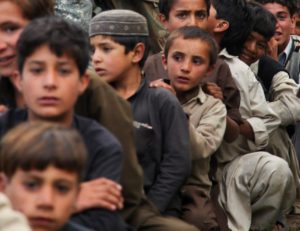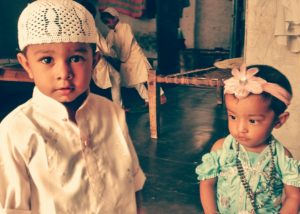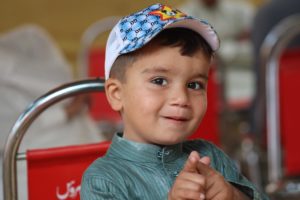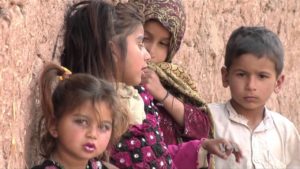By Marria Qibtia Sikandar Nagra
 Children are naïve. For their untainted minds and cherubic appearances , the world is generally a good place. They tend to view everyone in their own innocent image, unable to comprehend the horrific veneers of behaviour, some of their accomplices, who may be potential predators, shroud themselves in. When this naivety comes to be shattered through an unfortunate interaction with humans disguised as monsters, it is then that these little angels lose their faith in the goodness of people.
Children are naïve. For their untainted minds and cherubic appearances , the world is generally a good place. They tend to view everyone in their own innocent image, unable to comprehend the horrific veneers of behaviour, some of their accomplices, who may be potential predators, shroud themselves in. When this naivety comes to be shattered through an unfortunate interaction with humans disguised as monsters, it is then that these little angels lose their faith in the goodness of people.
For a developing country like Pakistan, amongst other struggling areas of concern, child abuse is a recurrently confronted menace, with seemingly no end to its pervasiveness. Be it the Kasur child rape scandal, or the brutal killing of innocent victims like Zainab, child abuse continues unabated despite strict laws in place.
 The perpetrators vileness and sadism is naturally the root cause of child abuse cases. However, another reason not comprehended in such scenarios and which indeed puts children at a greater risk as victims is the lack of surveillance and supervision of children by their immediate caregivers. Since the gradual transition of the family unit to a nuclear one, and the engagement of parents in dispensing vocational responsibilities, it is the children who come to suffer the most in the process. Alone at home, or in the street playing around with their little friends, they qualify as vulnerable targets to abuse at the hands of predators. This does not imply that the caregivers are solely responsible for this sad reality, but they do share a greater part of ensuring child security. Also the convenient ease with which the perpetrators tend to get away with their gruesome act of violence is another propellant. Just a sum of “hush money” and threats of defamation of family honour are enough to silence the victim’s family.
The perpetrators vileness and sadism is naturally the root cause of child abuse cases. However, another reason not comprehended in such scenarios and which indeed puts children at a greater risk as victims is the lack of surveillance and supervision of children by their immediate caregivers. Since the gradual transition of the family unit to a nuclear one, and the engagement of parents in dispensing vocational responsibilities, it is the children who come to suffer the most in the process. Alone at home, or in the street playing around with their little friends, they qualify as vulnerable targets to abuse at the hands of predators. This does not imply that the caregivers are solely responsible for this sad reality, but they do share a greater part of ensuring child security. Also the convenient ease with which the perpetrators tend to get away with their gruesome act of violence is another propellant. Just a sum of “hush money” and threats of defamation of family honour are enough to silence the victim’s family.
 In the midst of this reality, what is not understood is the insurmountable impact such cases not only have on immediate victims of abuse, but also on children falling in the same age bracket, who may hear or confront such harrowing news at some point in time.It makes children wrongfully believe in the overt use of power since it makes them see power as a means to an end. Having witnessed their helplessness in the face of authority, with aggrieved hearts, they shoulder this burden for a lifetime.The encounter that rendered them helpless, also breeds in them behavioural issues of which anxiety and trauma disorder tops the list. Scarred by their experience, they look on at life with emptiness.
In the midst of this reality, what is not understood is the insurmountable impact such cases not only have on immediate victims of abuse, but also on children falling in the same age bracket, who may hear or confront such harrowing news at some point in time.It makes children wrongfully believe in the overt use of power since it makes them see power as a means to an end. Having witnessed their helplessness in the face of authority, with aggrieved hearts, they shoulder this burden for a lifetime.The encounter that rendered them helpless, also breeds in them behavioural issues of which anxiety and trauma disorder tops the list. Scarred by their experience, they look on at life with emptiness.
 The lack of formal acceptability of these psychological conditions worsens their states. It impels them to resort to social isolation since detachment is what they seek refuge in. An overpowering sense of guilt consumes them to the point where they believe all that wrongfully happened to them, in some way or the other is a fault of their own. It could have been averted, but they failed to safeguard themselves. The practice of self-blame just doesn’t end there. It matures into a weak sense of self-perception , that ultimately hinders their personality growth.
The lack of formal acceptability of these psychological conditions worsens their states. It impels them to resort to social isolation since detachment is what they seek refuge in. An overpowering sense of guilt consumes them to the point where they believe all that wrongfully happened to them, in some way or the other is a fault of their own. It could have been averted, but they failed to safeguard themselves. The practice of self-blame just doesn’t end there. It matures into a weak sense of self-perception , that ultimately hinders their personality growth.
 To counter child abuse it is pertinent to realize that all laws are futile in attempt unless the primary guardians and caregivers fail to ensure child security. It is fore mostly their responsibility to protect their children and to not leave them unattended. Failing to do so simply puts children at a risk for exploitation. The ultimate duty for the prevention of child abuse begins right at home. Before we hold anyone else accountable for the wrongs meted out to our children, for a moment just introspect what loopholes and lapses we indirectly exposed them to that may have resulted in their abuse.
To counter child abuse it is pertinent to realize that all laws are futile in attempt unless the primary guardians and caregivers fail to ensure child security. It is fore mostly their responsibility to protect their children and to not leave them unattended. Failing to do so simply puts children at a risk for exploitation. The ultimate duty for the prevention of child abuse begins right at home. Before we hold anyone else accountable for the wrongs meted out to our children, for a moment just introspect what loopholes and lapses we indirectly exposed them to that may have resulted in their abuse.
 For parents and caregivers it is very important to maintain a friendly and emotionally expressive relationship with their child.Instead of being critical, gearing to scold them on the minutest of excuses, it is indeed quite pertinent to be polite with them. A strained parent-child relation makes it hard for the child to come forward, voice his insecurities that may be disturbing him.Even if he feels uncomfortable around a potential abuser, he may not talk to his parents about it because of the wide communication gap that exists between them. He would be inclined to presume that no one is capable of understanding his concerns as a result he may end up hiding things form his parents which in the longer term may prove to be detrimental to his wellbeing.
For parents and caregivers it is very important to maintain a friendly and emotionally expressive relationship with their child.Instead of being critical, gearing to scold them on the minutest of excuses, it is indeed quite pertinent to be polite with them. A strained parent-child relation makes it hard for the child to come forward, voice his insecurities that may be disturbing him.Even if he feels uncomfortable around a potential abuser, he may not talk to his parents about it because of the wide communication gap that exists between them. He would be inclined to presume that no one is capable of understanding his concerns as a result he may end up hiding things form his parents which in the longer term may prove to be detrimental to his wellbeing.
 Moreover, children must be given an education on then difference between good and bad touch. In simplistic terms anything that makes them cringe, uneasy is a bad touch and they must be trained to categorically express their distaste instead of allowing it. As a conservative society, instead of hushing matters of overt physical nature, it is time that we discuss them with our children before its too late.Their security and safety primarily is contingent on a comprehensive awareness of their body ownership. No one has the right to make them feel uncomfortable by any means.
Moreover, children must be given an education on then difference between good and bad touch. In simplistic terms anything that makes them cringe, uneasy is a bad touch and they must be trained to categorically express their distaste instead of allowing it. As a conservative society, instead of hushing matters of overt physical nature, it is time that we discuss them with our children before its too late.Their security and safety primarily is contingent on a comprehensive awareness of their body ownership. No one has the right to make them feel uncomfortable by any means.
 Children are the credulous flowers that impart hope to life itself. A simple smile, a glimmer in their eyes, is enough to make peace with all that strains us. Let’s not steal their greatest asset, their innocence. Let’s allow them to envision the world as a good place. Let’s not unravel the façade of goodness that the world envelops itself in, to our children right before they are meant to understand this duplicity. Let’s play our part in making this world a safe place for them by protecting them against such cases of abuse. This life is their gift, lets not steal it from them.
Children are the credulous flowers that impart hope to life itself. A simple smile, a glimmer in their eyes, is enough to make peace with all that strains us. Let’s not steal their greatest asset, their innocence. Let’s allow them to envision the world as a good place. Let’s not unravel the façade of goodness that the world envelops itself in, to our children right before they are meant to understand this duplicity. Let’s play our part in making this world a safe place for them by protecting them against such cases of abuse. This life is their gift, lets not steal it from them.









